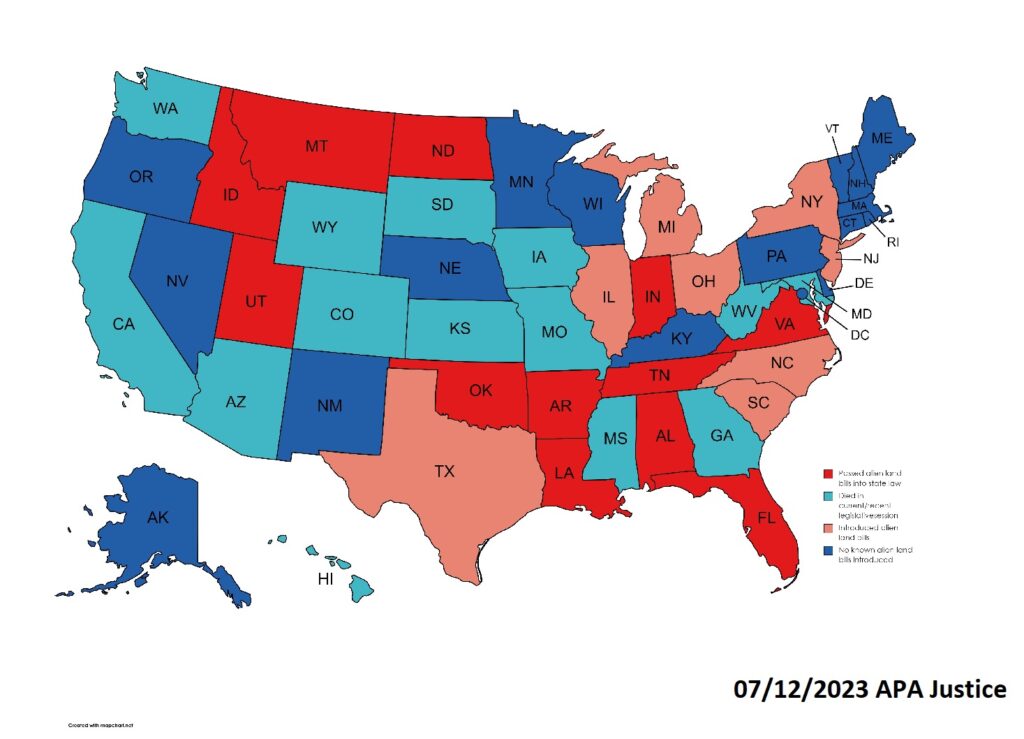Above: Representatives Mike Thompson (D-CA), Adam Smith (D-WA), and John Garamendi (D-CA)
Randall Yip is the founder and editor of AsAm News, where this story first appeared. It is re-printed here with permission.
They saw red and now some might say, they have eggs on their faces.
Three U.S. Congressmen set off alarm bells after a major land deal near a military base raised fears of Chinese spies.
According to ABC7 News, Flannery Associates has been purchasing $1 billion worth of farmland for the last five years near Travis Air Force Base in Fairfield, 50 miles east of San Francisco.
It’s not unusual for the backers of a corporation to remain anonymous.
However, with U.S.-China relations at a low, Reps Mike Thompson (D-CA), John Garamendi (D-CA) and Rep. Adam Smith (D-WA), the chairman of the House Armed Services Committee all expressed concern that Chinese spies were behind the purchase of 55,000 acres of farmland in Solano County.
When the dust settled, the truth finally came out. Flannery Associates is backed by Silicon Valley venture capitalist and billionaire Michael Moritz. Moritz has been highly critical of San Francisco’s liberal politics. His hopes are to build a new housing development and city near Travis Air Force Base, one he says will bring new jobs to the area.
But earlier, when asked if there was concern about Chinese malware impacting Travis, Thompson told ABC7 News, “I think that’s why we are all interested in this.”
According to the Silicon Valley anti-malware company Proofpoint, malware is installed when an unsuspecting user clicks on a malicious website, opens an attachment to an email or installs software infected with a virus.
The attack can originate from anywhere in the world, so it’s unclear why the Congressman thought spies would purchase $1 billion worth of land to launch a malware attack.
All of this could be dismissed with a shrug, except for one trend.
34 states as well as Congress have passed or have considered legislation to ban the purchase of land by Chinese and others from countries considered threats to the U.S. The bills are reminders of the Alien Land Law, a Congressional act that banned the purchase of land by Asians in 1924.

In Congress, APA Justice, citing Advancing Justice/AAJC tells AsAmNews that eight similar bills or amendments have been introduced.
“Legislative action must be based on evidence and facts, not fear,” said Edgar Chen, Special Policy Advisor, National Asian Pacific American Bar Association to AsAmNews. “While we recognize there are legitimate national security concerns over geopolitical competition between the United States and China, unless there is concrete evidence that land investments from individuals who hail from foreign nations, whether from China or elsewhere, are being used for espionage purposes, lawmakers should not rush to paint all real estate transactions – especially by ordinary individuals with no ties to foreign governments – as threats to national security.”
Thompson has proposed such a bill in Congress and a spokesperson defended his action.
“The bipartisan bill introduced by Congressman Thompson is important to close loopholes in federal law that could allow foreign adversaries to purchase agriculture land across our country that threaten our national security and food security. Congressman Thompson has always been a strong supporter of the AAPI community and will continue to work with local AAPI leaders as we continue to hear more about the proposed project in Solano County,” said the spokesperson.
Despite repeated attempts beginning last week and including this morning, representatives from Garamendi and Smith’s office, did not get back to us with comments.
Here’s what they said earlier.
“We have heard scheme after scheme that makes no sense at all,” Rep. Garamendi said. “We’re going to build a deep water port. Really? Around Travis Air Force Base? Which is 10 miles from the Bay. No, you’re not… We’re going to farm… well at that price you’re going to lose a lot of money farming. Well, we’re going to build a city… No, you’re not going to build a city…so none of the reasons why the land is being acquired make any sense at all.”
Rep. Smith says the U.S. will continue to do business with China, but needs to be cautious.
“We have foreign direct investment in this country, from a wide variety of countries,” Rep. Smith said. “I think we need to get the information and evaluate what the best steps forward are to protect national security.”
Cynthia Choi of Chinese for Affirmative Action and co-founder of Stop AAPI Hate expressed her own concerns.
“Many politicians have been citing Chinese ownership of farmland as a threat to national security, when in reality, experts say Chinese land ownership accounts for less than 1% of farmland and an even smaller percentage of agricultural land. Despite the facts, they continue to sensationalize issues regarding China to justify overreaching measures that harm innocent Asian Americans and immigrants,” she said to AsAmNews.
The ACLU recently joined in a lawsuit to overturn a ban against Chinese ownership of homes and land in Florida signed by GOP presidential candidate and Gov. Ron DeSantis.
“We continue to remain concerned about any attempt by Congress to target individuals solely because of their national origin, which falsely equates individuals from countries like China as synonymous with the Chinese government,” said Kia Hamadanchy, senior policy counsel at ACLU.
“These efforts are a reminder of historical instances where false claims of national security were used as a justification to prohibit Asian immigrants from becoming landowners and will only serve to exacerbate discrimination against Asian communities living in the United States.”
This resource is supported in whole or in part by funding provided by the State of California, administered by the California State Library in partnership with the California Department of Social Services and the California Commission on Asian and Pacific Islander American Affairs as part of the Stop the Hate program. To report a hate incident or hate crime and get support, go to CA vs Hate.





